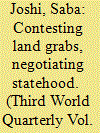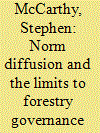| Srl | Item |
| 1 |
ID:
174556


|
|
|
|
|
| Summary/Abstract |
In Cambodia, rural citizens embroiled in protracted land grabbing cases with the state and private companies are turning increasingly to international accountability mechanisms for resolution. This article applies the interlinked concepts of hybrid governance and legal pluralism to understand the prospects and limitations of ‘forum-shopping’ through appeals to international mechanisms for rural communities affected by land grabs. Drawing on interviews and using process tracing, it examines the outcomes of a mediation case filed with the International Finance Corporation’s Compliance Advisor/Ombudsman (CAO) involving indigenous groups and a Vietnamese rubber company in north-east Cambodia. It argues that while international accountability mechanisms yield platforms for dispossessed groups to assert claims, they also reify choices between entitlements and attainability without circumventing the problems associated with justice delivery under Cambodia’s authoritarian regime. Overall, this study highlights the interaction, competition and collaboration between distinct forms of regulatory authority exercised by national and transnational actors involved in land grabbing cases in Cambodia, demonstrating their role in ‘negotiating statehood’ by governing local claims to land.
|
|
|
|
|
|
|
|
|
|
|
|
|
|
|
|
| 2 |
ID:
135086


|
|
|
|
|
| Summary/Abstract |
The return of the World Bank Group (WBG) to Burma after some 25 years’ absence, along with other international financial organizations, follows a series of extraordinary political reforms that have taken place in the country since 2010. Burma has made a transition from 50 years of authoritarian rule to what its leaders call ‘disciplined democracy’. This paper examines the likely consequences of the Bank's return for the forestry sector in Burma and the potential outcomes in forestry governance given the evolution of its development agenda over the past 25 years. While measures to address deforestation have been applied in Southeast Asia, the success of forestry governance reforms depends to a large extent on their endorsement and adoption by local power structures and political figures, as well as on the nature of the political regime itself. The record on forestry governance in Southeast Asia is particularly poor and international financial organizations continue to neglect the local political economy of deforestation. Comparatively, few studies have attempted to investigate the relationship between types of political regimes and rates of deforestation. The paper examines two other new democracies in Southeast Asia (Indonesia and Cambodia), and the impact that governance reforms have had on their deforestation trends and land use, in order to contextualize the potential impact of the WBG's return to Burma. In Southeast Asia, powerful vested interests continue to outweigh the support inside governments or civil society for the forestry governance norms promoted by international organizations. The cases of Indonesia, Cambodia and Burma illustrate that deep patrimonial interests operate within the region and that local politics cannot be ignored by international organizations designing policy reforms. The WBG should effectively engage wherever possible with the local communities and a broad range of civil society groups before developing further initiatives.
|
|
|
|
|
|
|
|
|
|
|
|
|
|
|
|
| 3 |
ID:
112941


|
|
|